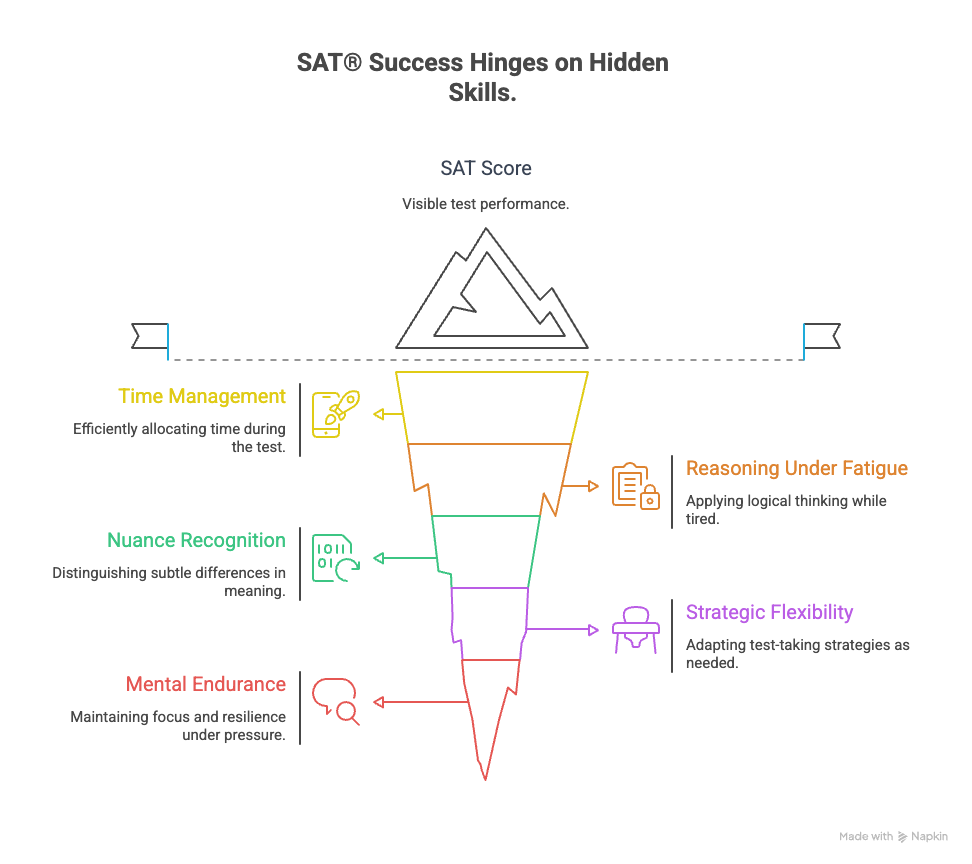You sit down to study. You open the page. Then, boom, you remember something. You check your phone. You scroll. You forget what you were even doing. You start again. And then you blame yourself: "Ugh, I'm just not someone who can focus."
Stop right there. That's not the truth. That's just the story we've been told.
Focus isn't a fixed trait you're either born with or not. It's a skill and you can build it just like any other. Let's ditch that myth and rebuild your attention for better SAT® study strategies.
Why You're Not Broken: Your Brain's Just Adapted
The average teenager switches tasks every 47 seconds online. It's not because you lack discipline. It's because you're living in a world that trains your brain to expect something new every few seconds.
This isn't accidental. Every platform you scroll is designed to hit your dopamine system, giving you little rewards for likes, clicks, and notifications. Your brain learns: new equals exciting, which means it's worth checking. Old equals effort, so avoid.
You're not bad at focusing for your SAT® prep. You've just practiced distraction more often.
The good news? Skills are reversible. You can unlearn the noise and train your attention. This is key for SAT® and mental resilience.
The Science Behind Why You Drift (Even When You Care)
1. Attention Residue
When you switch between tasks (like going from an SAT® practice question to Instagram and then back to the question), part of your brain stays stuck on the thing you just left. It takes time to fully "return" to your study zone.
This is called attention residue (Leroy, 2009). It means multitasking, even a quick glance at your phone, costs more than you realize. That "quick check" isn't 5 seconds. It's a 15-minute drop in clarity for your SAT® study strategies.
2. Context Switching Costs
Every time you jump between tabs, apps, or tasks, your brain burns glucose trying to reorient itself. You end up feeling more tired and less capable.
This is why focus isn't about working longer. It's about protecting continuity during your SAT® prep.
3. Dopamine Fatigue
When you flood your brain with constant hits of fast dopamine (from scrolling, likes, notifications), it makes deeper work, like intense SAT® study, feel dull, even if it truly matters to you.
Focus Techniques That Work (No Phone Deletion Required)
Let's skip the preachy advice. We know you're not deleting your phone. Instead, let's build a focus system that respects your mind, not punishes it, for better SAT® study strategies.
1. Design a Clean Entry Point
Don't just start studying by "opening your textbook." That's too vague. Your brain resists vagueness.
Try this: Start with a micro-decision for your SAT® prep: "I will write a 2-line summary of the first paragraph." That's it. One foot in the door. Once you enter, momentum will do the rest.
This works because clarity reduces friction. Vague goals create resistance. Specific actions create motion.
2. Use the Dopamine Loop For You, Not Against You
You don't need to suppress dopamine. You need to redirect it for your SAT® study strategies.
Try this: Use micro-rewards at checkpoints.
- 25 minutes of focused SAT® study and then one reel (yes, really).
- Finish one section and then stand, stretch, and reset.
The trick is intention before indulgence. Dopamine isn't bad. It just needs structure for optimal SAT® prep.
3. Build a Focus "Scene," Not Just a Schedule
Your brain connects places, smells, and sounds with tasks. This is called contextual anchoring. You can use it to your advantage for SAT® study strategies.
Try this:
- Choose one physical location for deep SAT® prep work only.
- Light the same candle when you study.
- Use a specific playlist just for deep work.
Eventually, your brain associates that cue with focus. The scene becomes the signal. The signal becomes your focused state. This builds SAT® and mental resilience.
.png)





